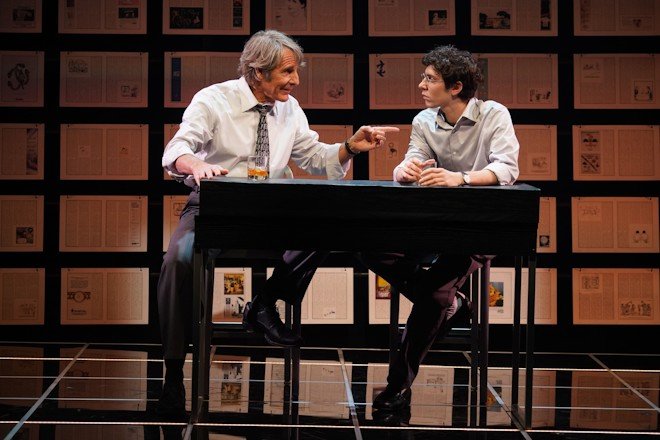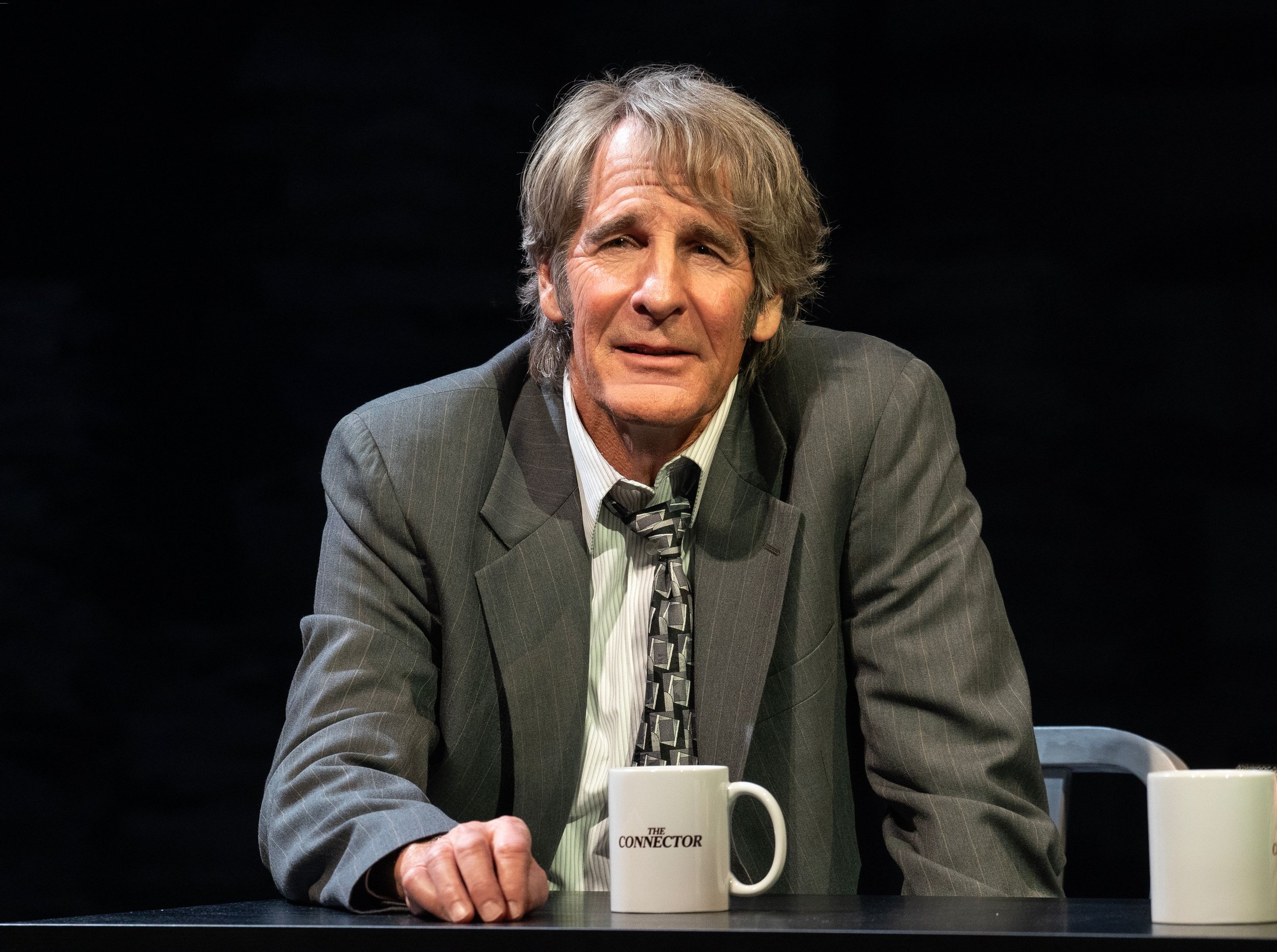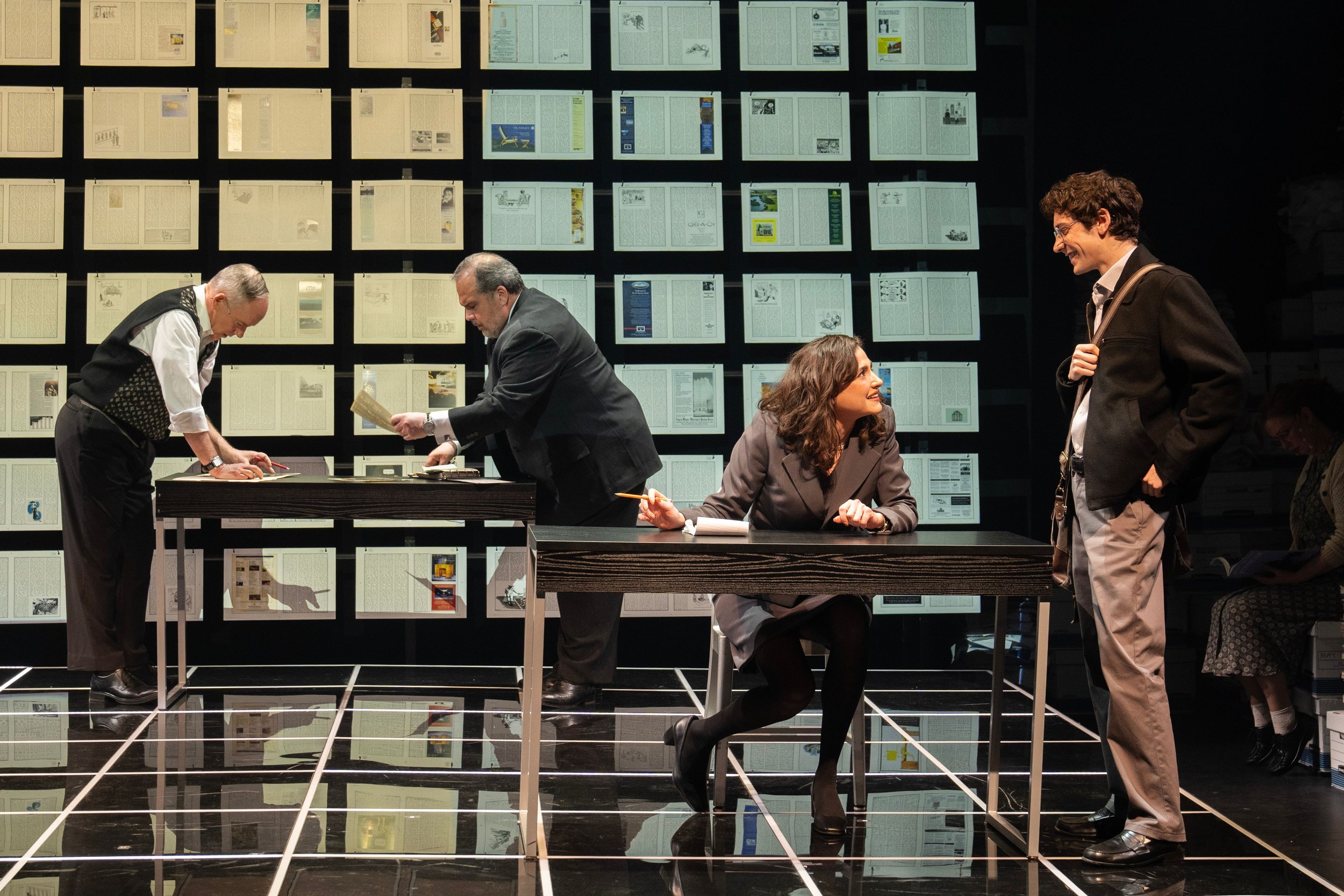Review: New Off-Broadway Musical "The Connector"A
All photos by Joan Marcus
The show: “The Connector” at off-Broadway’s MCC Theatre in New York City
What makes it special?: The latest musical by composer Jason Robert Brown, one of the leading musical lights in musical theater today
What’s it about: Ethan Dobson, a young journalist fresh out of Princeton, gets hired at a prestigious monthly magazine in the pre-Google, mid-’90s; an era when legacy newspapers and magazines were thriving and had a powerful presence in the culture.
But it soon becomes clear that Ethan is fabricating some, if not all, of his long-form stories, evoking the “new journalism” style, echoing back to a romanticized era of his editor, Conrad O’Brien. Ethan’s fraud is inevitably revealed, and the callow lad gets his comeuppance. The end.
Is that it? Pretty much. From the start, we know exactly how this narrative will proceed and how it will end.
It doesn’t help to have not only the leading character so transparent and unlikable but the two other leading characters don’t elicit much audience sympathy either. The character of Robin Martinez, a female colleague at the magazine — played by a strong-voiced Hannah Cruz — soon becomes dreary as she continually reminds us how she is overlooked because she is a woman and a Latina. Certainly valid; but simply unvaried.
As O’Brien, Scott Bakula’s has stage presence and solid vocals but it can’t mitigate a character so easily bamboozled merely because he so identifies with the young Ivy Leaguer. (We are told Ethan is a wonderful writer but when a snippet of his prose is read, it’s pretty hack. I don’t think I was alone in thinking why did Ethan choose journalism as a career in the first place when it’s clearly fiction he wants to write?) His motivations are never explored in Jonathan Marc Sherman’s reductive script, and the show’s central character isn’t given much of a backstory with only us left to wonder — who is this guy? All we are left with is simply watching Ethan’s deception deepen, nudged lamely by the editor’s urging him to write more boldly.
Side note: The show brings to mind a much more nuanced and dearer Evan Hansen from that much better musical. Ethan is played by Ben Levi Ross, who performed as Evan Hansen during that show’s long run. Ross also has retained many of Hansen’s characteristic tics, twitches and overly emotive notes. (Ross clearly has strong musical chops, but his character’s one-dimensional pathology makes his big notes all one note.)
Basically, Ethan as presented here is a sociopath. But even sociopaths know they have to develop certain people skills. But from the get-go Ethan is clearly a phony who can be spotted a mile away, and presumably directed as such by Daisy Prince who conceived and staged the production. In fact, several of Ethan’s co-workers immediately sense something isn’t quite right with the newbie hire. But O’Brien is blinded by the growing popularity of Ethan’s pieces and is besotted in their mentor-mentee relationship. (Also off-putting was making this Manhattan editor of a prestigious magazine look more like Lou Grant than Graydon Carter.)
Robin — who may or may not be his girlfriend (the relationship is vague) — clearly has her doubts about Ethan. Unfortunately her character trait is resentment, repeatedly complaining about how she is overlooked which she makes abundantly clear when she is given one long, loud, angst-filled song about how unfair the white boys’ club is — damn the patriarchy! So much for any audience sympathy after that number.
Doesn’t sound inviting so far: It needn’t have been so. Giving Ethan some charm and history — after all, why does he do it? — would have helped. Exploring the many gray areas of journalism — one thinks of the play “Lifespan of a Fact” — would have been more interesting. Introducing the plot point of a corporate takeover of the previously privately-owned magazine suggests an interesting dimension of that era of journalism — but it is quickly trivialized and then dropped entirely.
The basic story arc simply doesn’t make sense for anyone working in journalism during that golden age of multiple editors and fact-checkers. Ethan’s first big story was about a popular Scrabble whiz in the Village — but no one in Manhattan ever hear of him? In the end, Robin tells him that the truth was enough to write about — but for Ethan there was never any truth to begin with. And the abstract question of what is truth? The question is moot here. It was all fabrication.
Anything positive? Jason Robert Brown has once again come up with a smart, varied and tuneful score — with wonderfully crafted lyrics lyrics that have more nuance than the script.
And Jessica Molaskey as the magazine’s veteran proofreader is terrific in a great number late in the show, “Proof,” that makes the case for standards and practices.
Beowulf Boritt also created a stylish and spare design with huge stacks of periodicals, papers and manuscripts bookending the stage, as well as an impressive upstage floor-to-ceiling display of magazine layouts. He also provided a stunning scenic effect that elicits gasps. If only the rest of the show had that kind of impact.
Thoughts on leaving the parking lot: There are reasons shows try out out of town. More often than not plays — but especially musicals — need time and space for creators to listen to audiences (and even critics) and to ask themselves some very tough questions, Then make significant changes. Tighten the show. Fact-checking. Giving it a reason to sing. This show just did not have due diligence — or editors.







